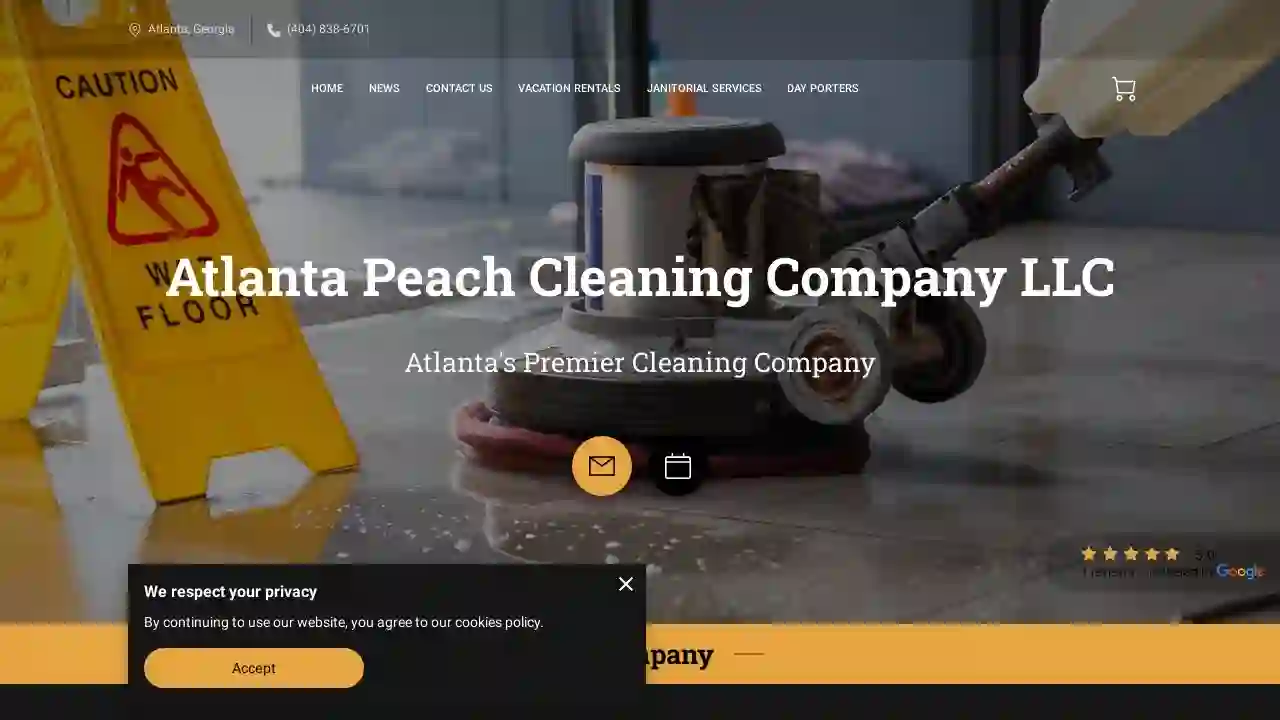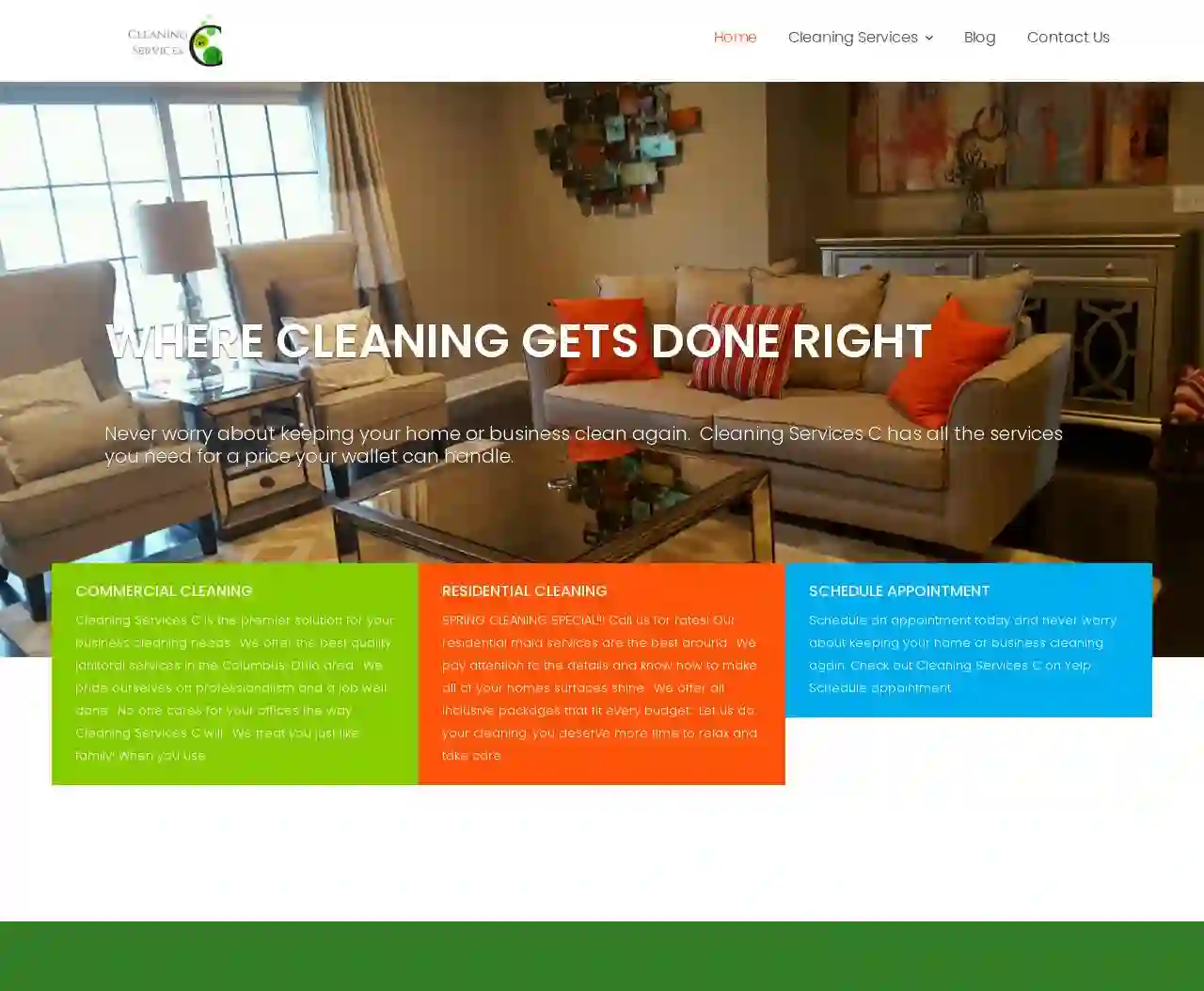Cleaning Services Montgomery
Find the best Cleaning Services in Montgomery
Get multiple Cleaning Companies quotes for your project today! Compare profiles, reviews, accreditations, portfolio, etc... and choose the best deal.
Service Needed
City or Town

Griffith Commercial Cleaning
57 reviewsAtlanta, US- Services
- Why Us?
Get Quote- Ur
Ur Way Cleaning Services LLC
58 reviewsColumbus, US- Services
- Why Us?
Get Quote - Cl
Clean House Solutions
4.615 reviewsAtlanta, US- Services
- Why Us?
Get Quote - JE
JEH Janitorial Services LLC
4.85 reviewsAtlanta, US- Services
- Why Us?
Get Quote 
Atlanta Peach Cleaning Company LLC
51 reviewsAtlanta, US- Services
- Why Us?
Get Quote
Turnkey Facility Maintenance
4.627 reviewsAtlanta, US- Services
- Why Us?
Get Quote
Cleaning Services C
4.711 reviewsColumbus, US- Services
- Why Us?
Get Quote- Ci
Cinderfella's ATL Commercial & Residential Cleaning
4.920 reviewsAtlanta, US- Services
- Why Us?
Get Quote 
Maids of Macon, LLC
4.852 reviewsMacon, US- Services
- Why Us?
Get Quote
JAN-PRO Cleaning & Disinfecting in Savannah
3.88 reviewsSavannah, US- Services
- Why Us?
Get Quote
Over 60,241+ Cleaning Companies on our platform
Our cleaning service providers operate in Montgomery and surroundings!
CleaningMatch has curated and vetted the Best Cleaning Contractors arround Montgomery. Find a reliable contractor today.
Frequently Asked Questions About Cleaning Services
Find answers to common questions about cleaning services and hiring cleaning companies in the USA.
- Ventilation: Open windows and turn on the exhaust fan to improve air circulation.
- Declutter: Remove any items from countertops, the shower, and the floor to allow easy access.
- Pre-treat: Spray shower walls, tub, and toilet bowl with bathroom cleaner and let it sit for a few minutes to break down grime.
- Toilet: Scrub the toilet bowl with a toilet brush, paying attention to the rim and under the seat. Wipe down the exterior of the toilet with a disinfectant wipe.
- Shower/Tub: Scrub the shower walls and tub with a sponge or scrub brush. Rinse thoroughly.
- Sink: Clean the sink with a sponge or cloth and bathroom cleaner. Pay attention to the faucet and drain.
- Mirrors and Glass: Wipe down mirrors and glass surfaces with a glass cleaner and a microfiber cloth for a streak-free finish.
- Floors: Sweep or vacuum the floor, then mop with a floor cleaner designed for your bathroom floor type.
- Finishing Touches: Empty the trash can, replace towels, and put away any toiletries.
- Clean Pet Bedding: Wash pet bedding regularly in hot water to remove odors and bacteria.
- Vacuum Thoroughly: Vacuum carpets, rugs, and upholstery frequently using a vacuum cleaner with a pet hair attachment.
- Enzyme Cleaners: Use enzyme cleaners specifically designed for pet odors. These cleaners break down the odor-causing molecules.
- Baking Soda: Sprinkle baking soda on carpets and upholstery, let it sit for a few hours, then vacuum. Baking soda absorbs odors.
- Air Fresheners: Use air fresheners or diffusers to mask odors temporarily.
- Professional Cleaning: For persistent odors, consider hiring a professional cleaning service specializing in pet odor removal.
- Experience: 'How long have you been in business, and what type of cleaning services do you specialize in?'
- Licensing and Insurance: 'Are you licensed, insured, and bonded? Can I see proof of coverage?'
- Background Checks: 'Do you conduct background checks on your employees?'
- Cleaning Supplies: 'Do you provide your own cleaning supplies and equipment, or should I provide them?'
- Cleaning Methods: 'What cleaning methods and products do you use?'
- References: 'Can you provide references from previous clients?'
- Scheduling and Availability: 'What days and times are you available for cleaning?'
- Pricing and Payment: 'What is your pricing structure, and what payment methods do you accept?'
- Cancellation Policy: 'What is your cancellation policy?'
- Satisfaction Guarantee: 'Do you offer a satisfaction guarantee? What happens if I'm not happy with the service?'
- Declutter first: Before cleaning, declutter surfaces and remove any items that don't belong. This makes cleaning easier and prevents distractions.
- Gather your supplies: Assemble all your cleaning supplies, including cleaners, cloths, sponges, and a trash bag, in a caddy or bucket to avoid wasting time searching for them.
- Work from top to bottom: Start cleaning from the top of each room and work your way down to prevent dust and debris from falling on already cleaned surfaces.
- Focus on high-traffic areas: Pay extra attention to high-traffic areas like kitchens and bathrooms, where dirt and germs accumulate quickly.
- Use the right tools: Utilize appropriate cleaning tools for different surfaces and tasks. Microfiber cloths are effective for dusting and cleaning glass, while scrub brushes are ideal for tough stains.
- Clean in sections: Break down larger tasks into smaller sections to avoid feeling overwhelmed. Focus on one area at a time before moving on to the next.
- Establish a routine: Create a regular cleaning schedule and stick to it. This prevents dirt buildup and makes cleaning more manageable.
What is the best way to clean a bathroom?
Cleaning a bathroom effectively involves targeting key areas and using the right cleaning products. Here's a step-by-step guide:
By following these steps, you can maintain a clean and hygienic bathroom.
By following these steps, you can maintain a clean and hygienic bathroom.
How do I get rid of pet odors in my home?
Pet odors can linger in a home, creating an unpleasant environment. Here's how to eliminate them:
Regular cleaning, enzyme cleaners, and baking soda are effective methods for eliminating pet odors and maintaining a fresh-smelling home.
Regular cleaning, enzyme cleaners, and baking soda are effective methods for eliminating pet odors and maintaining a fresh-smelling home.
What should I ask a cleaning service before hiring them?
Before hiring a cleaning service, consider asking these questions to ensure they meet your requirements and expectations:
By asking these questions, you can assess their professionalism, reliability, and suitability for your cleaning needs.
By asking these questions, you can assess their professionalism, reliability, and suitability for your cleaning needs.
What are some tips for cleaning my own home efficiently?
Cleaning your home efficiently can save time and effort. Follow these tips to streamline your cleaning routine:
By implementing these strategies, you can clean your home more efficiently and maintain a cleaner and healthier living space.
By implementing these strategies, you can clean your home more efficiently and maintain a cleaner and healthier living space.
What is the best way to clean a bathroom?
Cleaning a bathroom effectively involves targeting key areas and using the right cleaning products. Here's a step-by-step guide:
By following these steps, you can maintain a clean and hygienic bathroom.
- Ventilation: Open windows and turn on the exhaust fan to improve air circulation.
- Declutter: Remove any items from countertops, the shower, and the floor to allow easy access.
- Pre-treat: Spray shower walls, tub, and toilet bowl with bathroom cleaner and let it sit for a few minutes to break down grime.
- Toilet: Scrub the toilet bowl with a toilet brush, paying attention to the rim and under the seat. Wipe down the exterior of the toilet with a disinfectant wipe.
- Shower/Tub: Scrub the shower walls and tub with a sponge or scrub brush. Rinse thoroughly.
- Sink: Clean the sink with a sponge or cloth and bathroom cleaner. Pay attention to the faucet and drain.
- Mirrors and Glass: Wipe down mirrors and glass surfaces with a glass cleaner and a microfiber cloth for a streak-free finish.
- Floors: Sweep or vacuum the floor, then mop with a floor cleaner designed for your bathroom floor type.
- Finishing Touches: Empty the trash can, replace towels, and put away any toiletries.
By following these steps, you can maintain a clean and hygienic bathroom.
How do I get rid of pet odors in my home?
Pet odors can linger in a home, creating an unpleasant environment. Here's how to eliminate them:
Regular cleaning, enzyme cleaners, and baking soda are effective methods for eliminating pet odors and maintaining a fresh-smelling home.
- Clean Pet Bedding: Wash pet bedding regularly in hot water to remove odors and bacteria.
- Vacuum Thoroughly: Vacuum carpets, rugs, and upholstery frequently using a vacuum cleaner with a pet hair attachment.
- Enzyme Cleaners: Use enzyme cleaners specifically designed for pet odors. These cleaners break down the odor-causing molecules.
- Baking Soda: Sprinkle baking soda on carpets and upholstery, let it sit for a few hours, then vacuum. Baking soda absorbs odors.
- Air Fresheners: Use air fresheners or diffusers to mask odors temporarily.
- Professional Cleaning: For persistent odors, consider hiring a professional cleaning service specializing in pet odor removal.
Regular cleaning, enzyme cleaners, and baking soda are effective methods for eliminating pet odors and maintaining a fresh-smelling home.
What should I ask a cleaning service before hiring them?
Before hiring a cleaning service, consider asking these questions to ensure they meet your requirements and expectations:
By asking these questions, you can assess their professionalism, reliability, and suitability for your cleaning needs.
- Experience: 'How long have you been in business, and what type of cleaning services do you specialize in?'
- Licensing and Insurance: 'Are you licensed, insured, and bonded? Can I see proof of coverage?'
- Background Checks: 'Do you conduct background checks on your employees?'
- Cleaning Supplies: 'Do you provide your own cleaning supplies and equipment, or should I provide them?'
- Cleaning Methods: 'What cleaning methods and products do you use?'
- References: 'Can you provide references from previous clients?'
- Scheduling and Availability: 'What days and times are you available for cleaning?'
- Pricing and Payment: 'What is your pricing structure, and what payment methods do you accept?'
- Cancellation Policy: 'What is your cancellation policy?'
- Satisfaction Guarantee: 'Do you offer a satisfaction guarantee? What happens if I'm not happy with the service?'
By asking these questions, you can assess their professionalism, reliability, and suitability for your cleaning needs.
What are some tips for cleaning my own home efficiently?
Cleaning your home efficiently can save time and effort. Follow these tips to streamline your cleaning routine:
By implementing these strategies, you can clean your home more efficiently and maintain a cleaner and healthier living space.
- Declutter first: Before cleaning, declutter surfaces and remove any items that don't belong. This makes cleaning easier and prevents distractions.
- Gather your supplies: Assemble all your cleaning supplies, including cleaners, cloths, sponges, and a trash bag, in a caddy or bucket to avoid wasting time searching for them.
- Work from top to bottom: Start cleaning from the top of each room and work your way down to prevent dust and debris from falling on already cleaned surfaces.
- Focus on high-traffic areas: Pay extra attention to high-traffic areas like kitchens and bathrooms, where dirt and germs accumulate quickly.
- Use the right tools: Utilize appropriate cleaning tools for different surfaces and tasks. Microfiber cloths are effective for dusting and cleaning glass, while scrub brushes are ideal for tough stains.
- Clean in sections: Break down larger tasks into smaller sections to avoid feeling overwhelmed. Focus on one area at a time before moving on to the next.
- Establish a routine: Create a regular cleaning schedule and stick to it. This prevents dirt buildup and makes cleaning more manageable.
By implementing these strategies, you can clean your home more efficiently and maintain a cleaner and healthier living space.